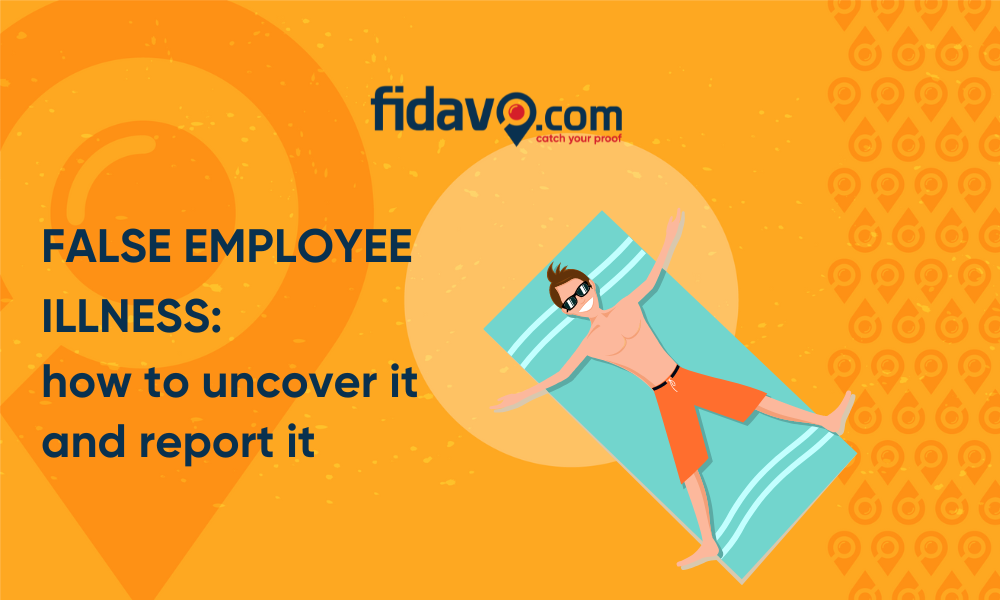False employee illness: how to uncover it and report it

Can an employer dismiss an employee for false illness?
As demonstrated by the judgments issued by the Court of Cassation in recent years, yes, but only when the employer manages to gather all the necessary evidence and present them in accordance with the law.
Proving the occurrence is not easy, unless you avail yourself of the services of an expert specialized in investigations.
In the following lines, we will delve into the topic and explain how to proceed in such a situation. In particular, we will see the steps to take in case of disciplinary action for false statements regarding the employee's health condition.
When does it qualify as false illness?
This category includes all situations where there is an evident discrepancy between the statements (including written ones, such as certificates and medical reports) made by the employee and the actual evidence that proves their good health.
Fraudulent simulation of illness is incompatible with the nature of the employment relationship, which is based on continuity in terms of presence and duties. Such conduct is synonymous with unreliability, even when the hiring is done through a fixed-term or occasional work contract.
Is it a crime?
The answer is yes, as the employee receives public funds based on false statements. In almost all cases, therefore, dismissal not only leads to civil measures for administrative misconduct (including the loss of severance pay) but also to criminal consequences.
Legislative Decree 165 of March 30, 2001, stipulates, under article 55-V, imprisonment from 1 to 5 years and fines ranging from €400 to €1600 for employees responsible for the offense of simulating illness.
The crime of using false act allows the employer to act as a civil party to claim damages.
In this regard, it is worth mentioning the penalties provided for medical and healthcare personnel who issue counterfeit certificates or extend the period of absence from work. This constitutes the crime of false ideation committed by a public official, punishable by imprisonment from 3 to 24 months, as indicated in article 483 of the Criminal Code.
What to do to uncover false illness in an employee
Before filing a complaint or consulting a lawyer, the smartest solution is to rely on a private investigator to gather evidence. Through appropriate methods and tools, the expert can discover what is necessary to take legal action and implement disciplinary measures.
Avoid attempting to handle this task personally or delegating it to any of your employees. You might encounter irregularities and risk compromising the successful outcome of the procedure.
The role of a private investigator in cases of false illness
This professional figure acts as the ideal link between the company, the relevant law firm, the competent authorities, and the INPS, which is also responsible for conducting its own investigations to determine the fraudulent conduct of the employee.
Here's what a trustworthy private investigator should evaluate:
- inaccessibility during the scheduled hours for medical examinations without a justified reason;
- any negative consequences on the employee's health during the period of absence from work;
- engaging in another (undisclosed) job during the alleged period of illness.
Regarding the last point, the investigator will determine whether the employee has violated obligations towards the company owner (e.g., non-competition agreements) or has engaged in behavior that could adversely affect their physical condition.
Is surveillance of an employee permissible?
Yes, if you suspect that one of your employees has made false statements about their health, you can conduct surveillance, provided that a private investigator is the one carrying it out.
However, be aware of any material collected incidentally by others, such as photographs, videos, and audio files that demonstrate the inconsistency with a medical condition.
How to report false illness to the INPS
You simply need to request a physical examination at the employee's home through the appropriate reporting form from the INPS. The medical examiner can visit the employee's home not only on weekdays but also on weekends and holidays.
Here are the time slots:
- from 10:00 am to 12:00 pm and from 5:00 pm to 7:00 pm.
- for the public sector, schools, and the armed forces: from 9:00 am to 1:00 pm and from 3:00 pm to 6:00 pm.
In case of unjustified inaccessibility of the employee, evident discrepancies between statements and clinical findings, or attempts to hinder the recovery process, the INPS can take action for fraud.
Can I dismiss the employee based on the evidence obtained?
Certainly: dismissal with just cause due to bad faith can occur even if the threshold for the waiting period has not been exceeded.
To gather evidence quickly, safely, and discreetly, we recommend seeking the support of a private investigator.
 EN
EN  IT
IT 